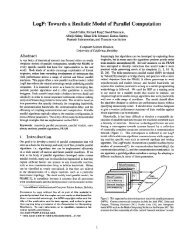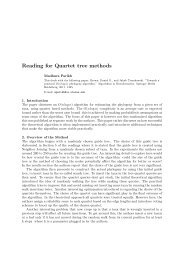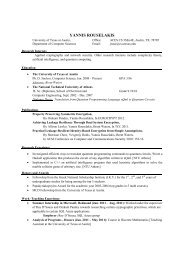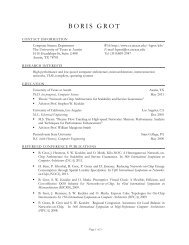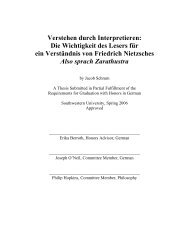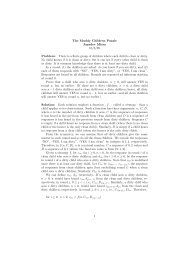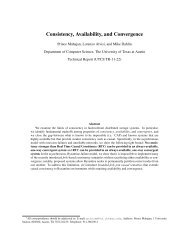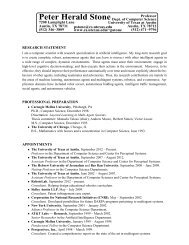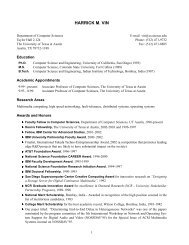A User's Guide to gringo, clasp, clingo, and iclingo
A User's Guide to gringo, clasp, clingo, and iclingo
A User's Guide to gringo, clasp, clingo, and iclingo
You also want an ePaper? Increase the reach of your titles
YUMPU automatically turns print PDFs into web optimized ePapers that Google loves.
3.1.8 Conditions<br />
Conditions allow for instantiating variables <strong>to</strong> collections of terms within a single rule.<br />
This is particularly useful for encoding conjunctions or disjunctions over arbitrarily<br />
many ground a<strong>to</strong>ms as well as for the compact representation of aggregates (cf. Section<br />
3.1.10). The symbol “:” is used <strong>to</strong> formulate conditions.<br />
Example 3.7. The following program uses conditions in a rule body <strong>and</strong> in a rule head:<br />
1 person(jane). person(john).<br />
2 day(mon). day(tue). day(wed). day(thu). day(fri).<br />
3 available(jane) :- not on(fri).<br />
4 available(john) :- not on(mon), not on(wed).<br />
5 meet :- available(X) : person(X).<br />
6 on(X) : day(X) :- meet.<br />
We are particularly interested in the rules in Line 5 <strong>and</strong> 6, instantiated as follows:<br />
5 meet :- available(jane), available(john).<br />
6 on(mon) | on(tue) | on(wed) | on(thu) | on(fri) :- meet.<br />
The conjunction in Line 5 is obtained by replacing X in available(X) with all The reader can reproduce these<br />
ground terms t such that person(t) holds, namely, t = jane <strong>and</strong> t = john.<br />
Furthermore, the condition in the head of the rule in Line 6 turns in<strong>to</strong> a disjunction<br />
over all ground instances of on(X) where X is substituted by some term t such that<br />
day(t) holds. That is, conditions in the body <strong>and</strong> in the head of a rule are exp<strong>and</strong>ed<br />
<strong>to</strong> different basic language constructs.<br />
Composite conditions can also be constructed via “:,” as in the additional rules:<br />
7 day(sat). day(sun).<br />
8 weekend(sat). weekend(sun).<br />
9 weekdays :- day(X) : day(X) : not weekend(X).<br />
Observe that we may use the same a<strong>to</strong>m, viz., day(X), both on the left-h<strong>and</strong> <strong>and</strong> on<br />
the right-h<strong>and</strong> side of “:.” Furthermore, negative literals like not weekend(X) can<br />
occur on both sides of a condition. Note that literals on the right-h<strong>and</strong> side of a condition<br />
are connected conjunctively, that is, all of them must hold for ground instances of<br />
an a<strong>to</strong>m in front of the condition. Thus, the instantiated rule in Line 8 looks as follows:<br />
8 weekdays :- day(mon), day(tue), day(wed), day(thu), day(fri).<br />
The a<strong>to</strong>ms in the body of this rule follow from facts, so that the rule can be simplified<br />
<strong>to</strong> a fact weekdays. (as done by <strong>gringo</strong>). �<br />
Note that there are three important issues about the correct usage of conditions:<br />
1. All predicates of a<strong>to</strong>ms on the right-h<strong>and</strong> side of a condition must be either domain<br />
predicates,i.e., predicates that can be completely evaluated during grounding,<br />
or built-in, which is due <strong>to</strong> the fact that conditions are evaluated during<br />
grounding.<br />
2. Any variable occurring within a condition is considered as local, that is, a condition<br />
cannot be used <strong>to</strong> bind variables outside the condition. In turn, variables<br />
outside conditions are global, <strong>and</strong> each variable within an a<strong>to</strong>m in front of a<br />
condition must occur on the right-h<strong>and</strong> side or be global.<br />
16<br />
ground rules by invoking:<br />
<strong>gringo</strong> -t



